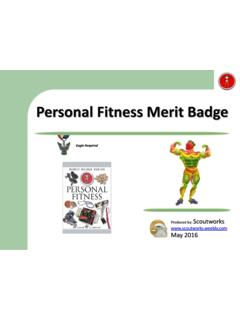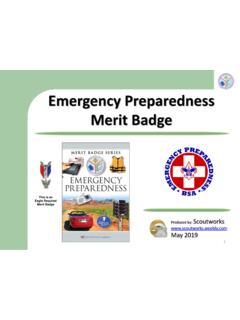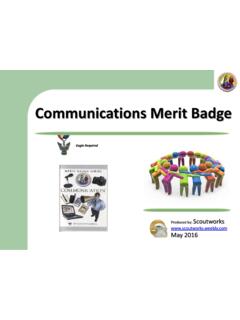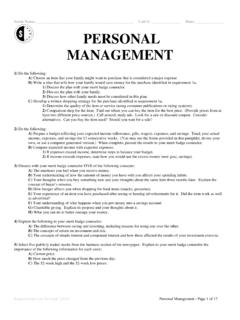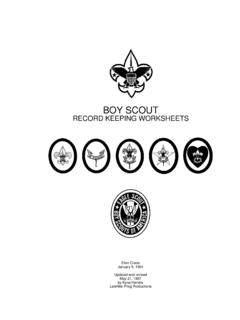Transcription of Personal Management Merit Badge - Scoutworks
1 Personal Management Merit Badge Produced by: Scoutworks May 2016 Eagle Required What You Need to Complete this Merit Badge Blue Card (from your Scoutmaster) Click on the link for instructions on how to fill it out Merit Badge Counselor Required Highly Recommended Personal Management Pamphlet (from the troop library or the scout store) Personal Management Workbook (free just click on the link) The Merit Badge Pamphlet & Workbook 1. This presentation DOES NOT replace the Merit Badge Pamphlet. You should 2. The Merit Badge workbook can help you complete your requirements but you still should Read the Merit Badge Pamphlet. The work space provided for each requirement in the workbook should be used to make notes for discussing each item with your counselor, not for providing full and complete answers.
2 3. Yo u must do each requirement to earn the Merit Badge . IMPORTANT NOTES! Read the Merit Badge Pamphlet What is Personal Management ? Taking control of your own life Making good decisions Responsible for your own successes Responsible for your own mistakes. Managing yourself & managing your money Managing Your Money No matter how much money you earn, you will need to manage it on a consistent basis. People today do not stay at one job for their lifetime. Short Term and Long Term Goals need to be set. A balance is needed in earning, spending and saving When buying an item, you need to reduce expenses in other areas Money is a major part of life, it affects your family s well being, however it should not be everything.
3 Smart Shopper Research the item they want to buy Watch for sales. Comparison Shop. Use Advertisements. Consider Alternatives. Use Consumer Buying Guides. Use the internet to check prices. Research The Item You Want Products Features What can you live with or without. More features, more money! Quality Paying more, will it last longer. Look for comparable quality for less money. Opinions From Others Talk with people who own one already. How do they like it? What did they pay? Look for stores who have sales/specials on items Clearance Items Seasonal Sales Promotional Sales New Items Blemished in store discounts Buy second hand? Usually large discounts. Flea Markets Garage Sales/ Yard Sales Swap Meets Buy It On Sale!
4 Comparison Shopping Compare at least three stores for price/availability Check the Internet, Catalogs, & Local Stores Check Cost per Unit, if you are buying goods in quantity (food for example) Check store guarantees, store or internet return policies. Shipping needs to be added on internet orders. Always check the stores for price matching discounts. Advertisements Be careful of advertisements, they sometimes stretch the truth. Bait & Switch? What is this??? Products say New & Improved . What are the improvements? Does it cost more money. Ads inform you of pricing, features of a product and where to buy it. Alternatives / Impulse Buying Part of being a good money manager is knowing when to say NO to yourself!
5 Try not to be in a hurry to buy the newest items, they reduce in price after being on the market for awhile. Sometimes the newest/greatest is not so good! Impulse Buying - (it is an immediate need/must have) Ex Shopping for food when you are hungry. Some people over buy when they are sad for comfort Feeling to keep up with the Jones s . Do not let money burn a hole in your pocket ! All kinds of feelings can affect your buying habits. Complete Requirement # 1 a. Choose an item that your family might want to purchase that is considered a major expense. b. Write a plan that tells how your family would save money for the purchase identified in requirement 1a. 1. Discuss the plan with your Merit Badge counselor 2.
6 Discuss the plan with your family 3. Discuss how other family needs must be considered in this plan. c. Develop a written shopping strategy for the purchase identified in requirement la. 1. Determine the quality of the item or service (using consumer publications or ratings systems). 2. Comparison shop for the item. Find out where you can buy the item for the best price. (Provide prices from at least two different price sources.) DO THE FOLLOWING: Use Your Personal Management Workbook Cash or Credit Should you use cash or credit to purchase? What is the difference between cash and a credit card What is buying on credit mean? Credit cards are: Convenient Easier to return items when purchased on credit cards Good record of expenses Better than carrying a lot of cash around Always pay off your monthly balance owed.
7 Try not to carry a balance on the card, you will pay much more than the original price. WHY?? Preparing a Budget A Budget is a written account of what you earn, spend and save. Organizes your finances. How much you receive as income Amount you use for expenses. Shows how much you save Standard goal is to save 10% of what you earn on a consistent basis. A budget shows you where you are spending your money. It helps guide you to either cutback on certain purchases, when you exceed your targeted expenses or shift money to savings when you have a surplus. Bank Accounts Bank accounts keep money safe. Federal Government insures your money in a bank Savings accounts earn interest Interest is paid at a very low rate You can have a checking account to use Write checks for expenses without having the cash on hand Debit cards can be issued on your checking accounts.
8 No cash is needed in your pocket. Keeps good records of expenses. Investing vs Savings Objective with investing money is: To make MORE money! A Financial Investment is something you put money into with the purpose of getting more money back! An investment can also be time/labor/asset. Purchase a lawnmower to cut grass for money in the neighborhood. The best investment made is in yourself. Education, learn new trades, new skills to help you earn more income. DO THE FOLLOWING: Use Your Personal Management Workbook a. Prepare a budget reflecting your expected income (allowance, gifts, wages), expenses, and savings. Track and record your actual income, expenses, and savings for 13 consecutive weeks.
9 (You may use the forms provided in the pamphlet, devise your own, or use a computer-generated version). When complete, present the records showing the results to your Merit Badge counselor. (There is a blank Sample Budget Plan table and a blank table for tracking your actual income and expenses that you can use at the end of the workbook.) b. Compare expected income with expected expenses. 1. If expenses exceed income, determine steps to balance your budget. 2. If income exceeds expenses, state how you would use the excess money (new goal, savings). Complete Requirement # 2 Use Your Personal Management Workbook 3. Discuss with your Merit Badge counselor FIVE of the following concepts: DO THE FOLLOWING: a.
10 The emotions you feel when you receive money. b. Your understanding of how the amount of money you have with you affects your spending habits. c. Your thoughts when you buy something new and your thoughts about the same item three months later. Explain the concept of buyer's remorse. d. How hunger affects you when shopping for food items (snacks, groceries). e. Your experience of an item you have purchased after seeing or hearing advertisements for it. Did the item work as well as advertised? f. Your understanding of what happens when you put money into a savings account. g. Charitable giving. Explain its purpose and your thoughts about it. h. What you can do to better manage your money. Complete Requirement # 3 Return On Investment (ROI) Most important to understand ROI, is the profit you receive or increased value of your investment.
